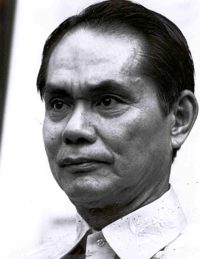Fanny Cortez-Garcia was desperate. She was with Ben Campomanes in her office and they said that the economic provisions in the new Constitution drafted by the Steering Council are terrible. There is no definite pattern, and no understanding of the implications of the provisions that have been incorporated. Many important provisions have been left out. Meanwhile, the deadline for submission of amendments is today, Friday.
Fanny was a former director of the influential Research Department of the Central Bank.
Ben Campomanes suggested that we meet at Fanny’s place. He informed us, however, that Gary Teves was in the province. I told him that Gary Teves knows what we have been doing in the committees. “That’s good,” he said, “you can even speak Gary’s mind.”
Which is true. Gary and I have been close. We implicitly understand each other.
I ate at the Quezon City Hall in order to save time. I immediately drafted a substitute amendment for the whole of Article XIV on the national economy by incorporating all those that we have approved during our meetings of the different committee chairmen, vice chairmen and sponsors.
I called up Fanny at 12:45 p.m. She was also going to rush to the session hall to meet with the sponsors. I suggested that she gets some Signatures from the members of the Sponsorship Council.
What I did upon finishing the draft which consisted of several pages, was to put in the names of the people who have been meeting with me during these last few days. Among them were Gary Teves, Erning Amatong, Adolf Azcuña and Julianing Locsin. I also included the names of Fanny Garcia, Monet Tirol and Ben Campomanes, among others. I told Mauro (Lolo) Baradi and Ikeng Corpus about this and they offered to sign as coauthors of my amendment. Pete Valdez said he was signing for camaraderie’s sake. He did not know what it was all about, but this was for him a simple case of trust in me.
It was unbelievable, though, the way the whole thing is being railroaded by the Steering Council. Why should we be given only this day to draft the amendments? Knowing it has the power and the full backing of Malacañang, the Steering Council has now really been urgently imposing upon us its own terms—practically dictating to us. What kind of delegates do we have in this Convention? How can anyone really draft amendments in one or two days’ time? I, myself, heard about this only from Fanny at 11 o’clock a.m.
I told Fanny that my understanding was that today, the Steering Council would present to the 166-man body its draft and thereafter we would have ten days from today within which to introduce our amendments. In other words, my understanding was instead of today being the last day for amendments, it is or should be the first day of a ten-day period of amendments. This would be the more reasonable thing to do.
But are we dealing with reasonable men?
This is it—today is the last day. The Steering Council has spoken. We must obey! I had two hours to write my amendments.
